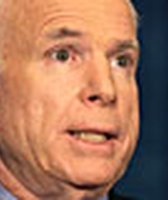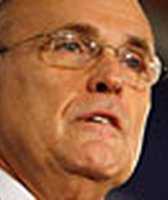Stand up for the facts!
Our only agenda is to publish the truth so you can be an informed participant in democracy.
We need your help.
I would like to contribute
SUMMARY: GOP frontrunner Rudy Giuliani is quick to the sword when it comes to top Democratic contender Hillary Clinton. But one of his frequent attacks — about the New York senator's thoughts on the free market — exposes his vulnerable record on the issue.
"The free market is . . . one of our greatest assets," Giuliani says often. "And the leading Democratic candidate once said that the unfettered free market is the most destructive force in modern America. I mean, just get an idea of where the philosophy comes from."
Giuliani made that remark during the October 2007 Republican debate in Dearborn, Mich. It's similar to a line he used during the GOP debate in May 2007 when he quoted Clinton saying the free market was "the most disastrous thing in modern America."
Either way he puts it, he's wrong.
In her 1996 book, It Takes a Village, Clinton quotes author Alan Ehrenhalt, who wrote in his book The Lost City: "The unfettered free market has been the most radically disruptive force in American life in the last generation." And during a March 1996 interview on the C-SPAN program Book Notes, Clinton said she agreed with the statement.
The word "disruptive" is not the same as "destructive" in the context of the free market, said Ehrenhalt, executive editor of Governing magazine. The magazine is published by CQ and is an affiliate of the St. Petersburg Times .
"There's no particular reason for a controversy," he said. "But Giuliani is looking for anything to say against Hillary Clinton ... and he keeps distorting it."
"There's a big difference between disruptive and disastrous," he continued. "You don't have to be too smart to understand that."
Ehrenhalt's book, published in 1995, focuses on how the free market can erode many of the local economic ties one has to a community, such as a neighbor's loyalty to a local merchant.
Most economists would agree, Ehrehalt said, with his assertion that the free market causes interruptions, whether positive or negative, in its normal course — which is the dictionary definition of disruptive. "It's hard to imagine that Giuliani doesn't support this concept," he said.
In fact, Giuliani has supported government exercising some measure of control over the free market. As mayor of New York, he backed measures in 1994 to extend most of the city's rent control and rent stabilization rules. If they expired, he said in a statement, "the result would be disastrous for the residents of more than 1-million households."
Twice more, in 1997 and 2000, he supported extending those measures.
"It's better to keep your constituents happy than to keep your political party happy," Giuliani told Time magazine in 1997.
Critics also note the mayor's record shows he supported an increase in the minimum wage in 2000 and called for more stringent limits on wholesale electricity rates in 2001.
The Club for Growth, a boisterous advocate for less government regulation, found "flashes of disappointment" in Giuliani's record as mayor. But they were largely outweighed by the "liberal context in which Giuliani was forced to govern."
"Mayor Giuliani's economic record is not perfect, but he deserves credit for the remarkable nature of his accomplishments," said president Pat Toomey, mentioning his efforts to cut spending and privatize some functions of government.
But now, as Giuliani courts hard-core conservatives for the Republican presidential nomination, his record conflicts with his statements on the campaign trail. In an August 2007 interview with CNBC, a questioner pressed Giuliani to lay out his view on the free market after criticizing Clinton.
"The free market is the best thing we have going for us," he said. "I think that that is the best answer to moving people out of poverty. "
Giuliani's campaign said the difference between his record and Clinton's is clear.
"After all, she said, 'We're going to take things away from you on behalf of the common good,' " spokesman Elliot Bundy said, referring to a speech Clinton gave in San Francisco in June 2004. "Mayor Giuliani has a different view. He believes it's your money; what you do with it should be your choice. Free markets are not the problem, as Hillary Clinton believes they are. Free markets are the solution."
Clinton, in her book and recent interviews, straddles the fence, saying she supports competitive markets but wants to distribute the nation's wealth.
"I don't want to do anything that in any way undermines our competitiveness or the opportunities for dynamism and growth, but I also want to get back to a better balance of shared prosperity," she told CNBC in an August 2007 interview. "It's not in America's long-term interest for the vast majority of Americans to feel like the deck is stacked against them, that they're not treated fairly."
As for the discrepancy in Giuliani's quote of Clinton's views, "disruptive" vs. "destructive," a Giuliani campaign spokesman didn't see the difference between the words.
"No one can deny that Mayor Giuliani was accurate in describing Hillary Clinton's economic philosophy," said Bundy.
Clinton's campaign is reluctant to engage Giuliani despite the obvious misquote. Not to mention, her full answer to the C-SPAN question provides more context. "The market is the driving force behind our prosperity, our freedom ... (but) it cannot be permitted just to run roughshod over people's lives as well," she said.
Our Sources
Transcript, CNBC Republican debate, CQ Transcriptions, Oct. 9, 2007
Transcript, Fox Republican debate, Federal News Service, May 15, 2007
Hillary Clinton, It Takes a Village, Simon & Schuster, 1996
Alan Ehrenhalt, The Lost City, Basic Books, 1995
Transcript , C-SPAN Book Notes, March 3 1996
Interview, Elliott Bundy, Giuliani campaign spokesman, Oct. 23, 2007
Interview, Alan Ehrenhalt, Exec. Editor, Governing magazine, Oct. 19, 2007
The New York Times, "Giuliani to Sign Rent-Rule Bill Lifting Some Controls for Rich," March 24, 1994. Newsday, "Rudy's Rent Lobby," April 15, 1997
The New York Times, "Giuliani Extends Rent Regulations," March 29, 2000
The New York Times, "Giuliani Calls for Tightening Controls on Electricity Rates," March 28, 2001
Time, "City Boosters: A New Breed of Activist Mayors Is Making City Hall a Hothouse for Innovation," Aug. 18, 1997
Transcript, "Late Edition with Wolf Blitzer," CNN, Feb. 06, 2000
Rudy Giuliani's Economic Record , Club for Growth, May 14, 2007
Transcript, CNBC's "Kudlow & Company," Federal News Service, Aug. 13, 2007
Transcript, CNBC's "The Call," Federal News Service, Aug. 7, 2007
"San Francisco rolls out red carpet for Clintons" Associated Press, June 29, 2004





































